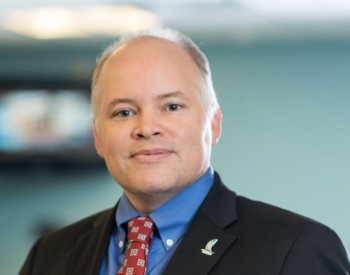As UT Health San Antonio expands its overall enterprise throughout the community, including the new UT Health San Antonio Multispecialty and Research Hospital, Eduardo Gomez, MBA, MSc, is expected to play a key role in its success. Gomez joined the institution in May as the inaugural director of strategic intelligence.

“Eduardo brings a wealth of knowledge related to strategic data and intelligence,” said Patrick Kaminski, MBA, vice president in the Office of Strategic Planning. “At first, he will be primarily involved with helping create strategic data tools to support key projections for the new hospital, along with supporting our ability to enhance existing tools to help us meet our strategic goals.”
Gomez holds a bachelor’s degree in industrial engineering from Texas A&M University in College Station, an MBA with a concentration in health care from Texas A&M in Corpus Christi and an MSc in health economics and decision modeling from the University of Sheffield in the United Kingdom.
“After finishing my MSc in November, I was looking for a place that would allow me to use my previous experience and combine it with my new knowledge to support organizational goals and strategic planning. Having just been in an academic environment in England, I found UT Health San Antonio to be a similar welcoming environment.” He said he noticed the organization’s goal of excellence right away and enjoys the thought of working in a place that routinely uses research data for improving health on a daily basis.
Another reason UT Health San Antonio seemed to be a good fit is that Gomez recalled visiting the university in 2008 at a critical juncture in his career. He attended a presentation by Paul Farmer, MD, PhD, hosted by the Center for Medical Humanities & Ethics. Dr. Farmer, an international public health, medical ethics and social justice expert from Harvard, is featured in the Pulitzer Prize-winning book, “Mountains Beyond Mountains.”
“[The book and presentation] really changed my concept of what health care is,” Gomez said. “Health care is not only about new buildings. It’s about how to prevent you from getting sick in the first place and how can we get you to manage your chronic conditions in a way that is not only cost effective but also gives you the highest quality of life possible.”
From 2001 to 2008, Gomez worked for HCA hospitals in Corpus Christi, Houston and New Orleans, where he developed data systems and dashboards to improve operational performance, processes and productivity. In 2008, he moved to the Driscoll Health System in Corpus Christi, where he was project manager for the implementation of its $20-million EPIC electronic medical records system. By 2019, he had progressed to assistant vice president of analytics at Driscoll after assembling a 20-member team responsible for creating a data-driven organization.
The team developed ways to use data for labor management, organizational reporting, strategic planning, capacity building, process improvement, metrics for clinical quality and key performance indicators, to name a few.
“Our team developed tools to extract the right data for the hospital, the clinics and the health plan. It gave me a really good view of the full circle of health care delivery,” Gomez said.
In 2019, Gomez took a sabbatical to study for his latest degree in England. He was just beginning his dissertation on the impact of using point-of-care testing for influenza in the emergency department when the COVID-19 pandemic began. His project examined whether a new, rapid diagnostic test for influenza A and B developed by industry could help improve capacity in the emergency department during the height of influenza season, as well as identify potential reductions in cost of care for patients who visit the emergency room. He found it interesting to see the parallels between the study he was involved with and the real-life development of rapid and accurate diagnostic screening tests for COVID-19.
He also is finishing a project with the Academic Health Unit of Health Economics at the University of Leeds on two studies stemming from his dissertation: a metanalysis on the observed accuracy of the cobas Liat point-of-care test for influenza and a simulation model on cost and quality of life on having point-of-care testing in the emergency department.
At UT Health San Antonio, his first tasks will be becoming familiar with the tools already used for data collection and analysis, and then developing dashboards to track the data necessary for leaders to make good decisions.
“We use internal and external data to support the growth of the organization and to be able to identify and provide the right health care for patients at the right place and at the right time,” he said.
His work will support several parts of UT Health San Antonio’s mission:
- Providing compassionate and culturally proficient health care.
- Engaging the community to improve health.
- Influencing thoughtful advances in health policy.
He is looking forward to being closer to family in San Antonio, continuing his bicycling hobby and volunteering as a child advocacy volunteer.
“I am still a governing board member of the Children’s Advocacy Center of the Coastal Bend in Corpus Christi,” he said. “At Driscoll, you’d get kids that would come into our Emergency Department as victims of abuse and it was absolutely heart wrenching. Ensuring the center continues its mission is my passion.”

